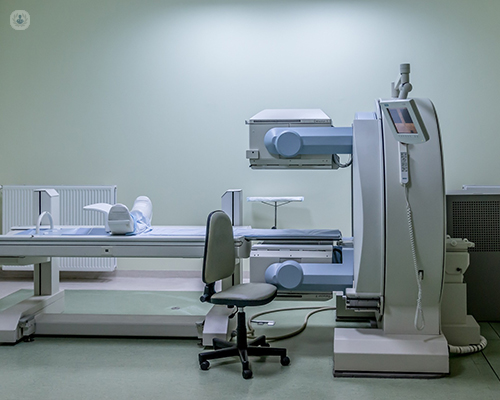A complete guide to prostate cancer screenings
Written in association with:Prostate cancer is a very common condition, affecting about 1 in 8 men at some point in their lives. In his latest online article, renowned consultant urological surgeon Mr Nimalan Arumainayagam explains the screening process for this cancer in detail, including the different tests and why it is so important.

How is prostate cancer screening performed in the UK? Who is included?
Prostate cancer screening in the UK is usually undertaken through primary care with GPS. There isn't a screening program similar to the one for breast cancer, so men do need to ask for a PSA test. Ideally, after the age of 50 men should be having a PSA test every year, but they will need to ask for that from their GP.
If they have a family history of prostate cancer, then that's often the motivation for them to be tested. The lifetime risk of a man having prostate cancer is one in eight, and it's doubled to one in four for those with a strong family history of the disease.
It could in theory include all men, but is mainly for men between 50 and 69. But beyond 69, as well, doesn't preclude a man from being tested.
The test is done through a PSA blood test, which is a prostate-specific antigen blood test. That's the first test it's normally performed along with an examination of the prostate through the back passage.
We then also organize an MRI scan of the prostate, and that's the imaging modality that's used to determine whether there's any abnormal area within the prostate, which might be cancerous. It will then be determined whether a biopsy is needed or not.

Why is prostate screening important?
Prostate screening or testing is important because whilst many men won't develop prostate cancer over their lifetime, for those that do, it can result in significant functional side effects. The consequence of not diagnosing prostate cancer early is that it can spread outside of the prostate to the lymph nodes, to the bones or other organs. At that stage, the disease is not curable. The goal of screening is to try and catch men at an earlier stage of their disease if they do have cancer, so that they can be treated. There are lots of treatments available, and many patients have a normal life expectancy.
There are over 11,000 deaths due to prostate cancer each year, and it's a significant cause of ill health, especially as men get older.
What does prostate cancer screening involve? What can patients expect from their appointment?
The first stage of screening involves taking history and discussing any relevant medical history with the patient. As well as determining whether there's a family history of prostate cancer, it is important to determine if there is a family history of breast cancer because having a strong maternal family history of breast cancer does put men at a slightly increased risk of prostate cancer.
They can expect to have an examination of the prostate if they are being seen in person. Some men will go straight to an MRI scan, and certainly, in the NHS, the pathway involves being triaged over the telephone, and often going straight to an MRI scan.
In the private sector, nearly all of these men will be seen face to face and have an examination and if needed will proceed to an MRI scan. The appointment is normally a 20 to 30-minute consultation. At the end of that appointment, a plan regarding the next steps will be made. Sometimes that may involve repeating the PSA test before proceeding with an MRI scan.
What are the early signs of prostate cancer?
Often there are no signs because often the cancer is picked up with PSA testing. It’s the blood test through their GP or through other means through health checks as part of their insurance policies. We often see some symptoms in men with benign enlargement of the prostate. However, having urinary symptoms doesn't necessarily mean someone has prostate cancer.
Picking up early signs of prostate cancer is difficult. When prostate cancer is more advanced or spreads, then the signs to account for are new bone or back pain, and weight loss. Sometimes it can cause symptoms such as blood in the urine, difficulty in urinating and needing to get up at night to urinate.

What are the next steps following a prostate cancer screening appointment?
Following a PSA blood test, the next step normally involves discussing whether or not an MRI scan is required. If an MRI scan is needed, then that's all organized. Not all men can have an MRI scan as many people are claustrophobic. Nowadays we can still do MRI scans for the prostate without putting the man completely into the scanner.
After the MRI scan, the next step involves discussing whether a biopsy is needed. If the MRI scan is clear and doesn't show any abnormality then we often won't proceed to do a biopsy straight away. If the MRI scan shows an abnormality, then the next step usually involves having a biopsy of the prostate
Mr Nimalan Arumainayagam is a highly-respected consultant urological surgeon with more than 20 years of experience. If you would like to book an appointment with Mr Arumainayagam you can do so today via his Top Doctors profile.


